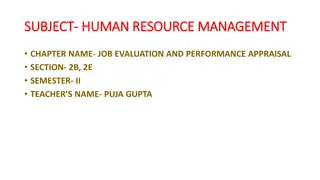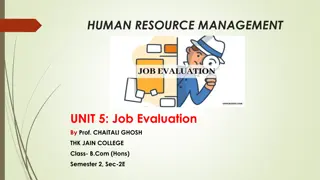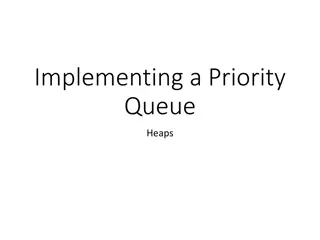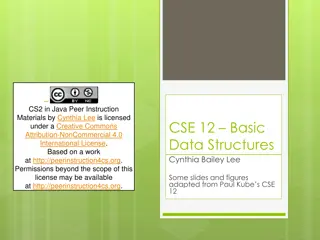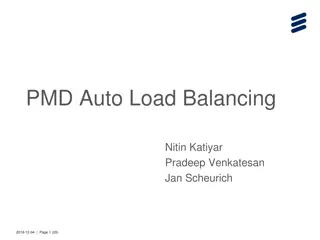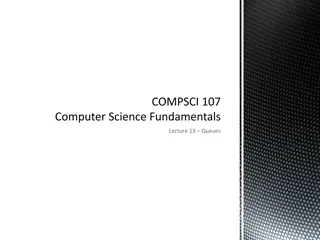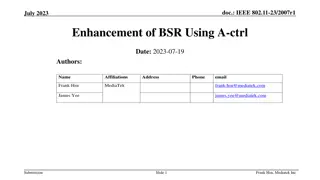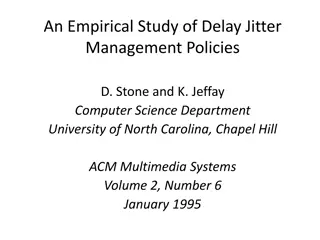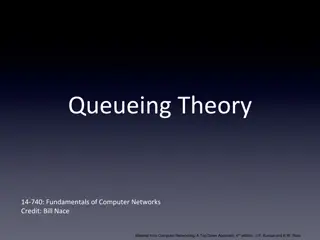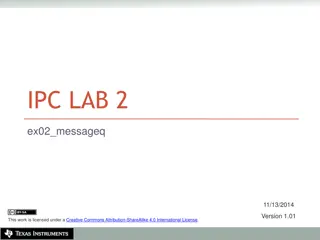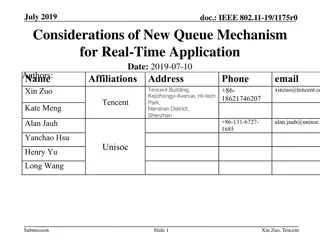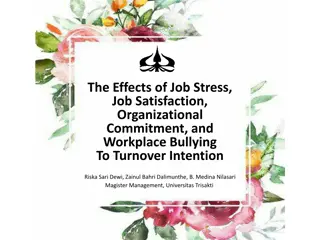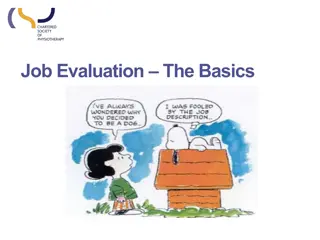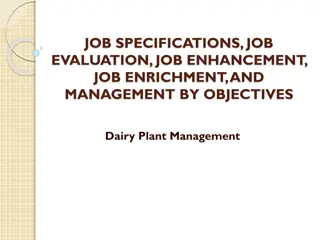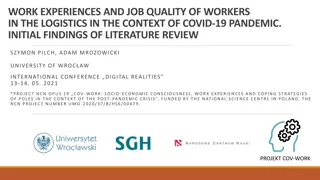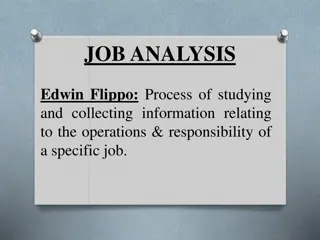Navigating the Job Market: Tips and Timelines
Discover valuable insights on preparing for the job market, including timelines for academic and non-academic research jobs, job search basics, types of academic positions, and essential materials for a successful job application process. Gain a comprehensive overview of the academic job market, lea
2 views • 23 slides
Understanding Job Analysis Process and Components
Job analysis involves collecting information about a job, including the knowledge, skills, and abilities required for effective performance. It covers work activities, tools and equipment used, work performance standards, job context, and personal requirements. The process helps in defining job role
1 views • 25 slides
Understanding Attitudes and Job Satisfaction
Attitudes play a crucial role in shaping our feelings towards objects, people, or events, influencing our behavior and job satisfaction. Components of attitudes include behavioral, cognitive, and affective aspects. Cognitive dissonance arises from conflicting attitudes or behavior. Major job attitud
1 views • 17 slides
Federal Energy Regulatory Commission Transmission Update - Nov. 3, 2023
FERC, led by Director Rob Thormeyer, regulates natural gas wholesale facilities, interstate pipelines, onshore LNG facilities, wholesale electric market rates, and more. The Commission consists of five appointed Commissioners overseeing key initiatives like transmission planning proposals and interc
0 views • 14 slides
Understanding Job Analysis and Design Terminologies
Job analysis involves analyzing tasks, duties, and responsibilities to achieve organizational goals. It includes defining job terminologies like job, duty, task, position, and job title. Reflect on the numbers of jobs and work positions in a department setting. Know when and who performs job analysi
0 views • 31 slides
Understanding Queuing Theory and Its Applications in Operations Research
Queuing theory is a mathematical study of waiting lines, or queues, commonly applied in operations research to predict queue lengths and waiting times. It helps businesses make decisions regarding resource allocation for efficient service provision. This field also encompasses queue discipline and E
1 views • 10 slides
Understanding Job Evaluation: Process and Importance
Job evaluation involves systematically analyzing and assessing the relative worth of different jobs within an organization. It helps determine job hierarchy, fair wages, and minimize discrimination. The process includes gathering job-related data, comparing job duties, and ensuring equitable pay bas
0 views • 17 slides
Importance and Methods of Job Evaluation in Human Resource Management
Job evaluation is essential in determining the value of a job within an organization, aiding in fair pay structures, employee selection, bonus calculations, and conflict resolution. However, it has disadvantages like inaccuracies, time consumption, and complexity. Steps involved include job analysis
3 views • 11 slides
Mastering Job Campaigns for Successful Employment
Discover the ins and outs of launching an effective employment campaign, from understanding the nature of job campaigns to exploring the history of job-hunting methods. Learn about important aspects like employer perspectives, job-hunting myths, and the significance of an active approach in job camp
0 views • 21 slides
Importance of Job Description and Job Specification in Job Analysis
Job description and job specification are essential components of job analysis, providing crucial data for HR managers to understand job requirements and find the right candidate. While not legal requirements, they play a vital role in recruiting, selecting, and placing employees effectively. Job de
0 views • 6 slides
Understanding Job Evaluation in Human Resource Management
Job evaluation is a systematic process that helps determine the value and worth of jobs performed within an organization, essential for establishing fair wage and salary structures. This evaluation involves assessing job demands, relative worth, skills required, and other human qualities. The primar
1 views • 10 slides
Enhancing Diversity and Productivity Through Job Sharing in the Insurance Sector
Advertising roles as open to flexible working, including job sharing, is crucial for attracting diverse talent and reducing the gender seniority gap in the insurance industry. Job sharing benefits both employees and employers, increasing productivity and well-being. Evidence suggests that job sharin
0 views • 9 slides
Understanding the Non-Blocking Michael Scott Queue
The Non-Blocking Michael Scott Queue, presented by Gurudatta Patil, is a thread-based data structure where threads help each other in managing a queue efficiently. Threads collaborate to add nodes at the tail and remove them from the head, ensuring smooth operation even in a non-empty queue scenario
0 views • 17 slides
Tutorial on DIRAC Web Interface for JUNO DCI Group
Explore the functionalities of the DIRAC web interface, with features like checking task and job statuses, site statuses, and submitting jobs easily. Learn how to load user certificates, upload proxies, and manage job launchpads effectively. Dive into exercises for submitting jobs, using parameters
0 views • 14 slides
Understanding Priority Queues and Heaps
Priority queues differ from regular queues by maintaining an ordering of items based on priority rather than first-in-first-out. Items in a priority queue are assigned priority values and the highest priority item is removed first. Different data structures can be used to efficiently insert and remo
0 views • 54 slides
Understanding Binary Heaps: Efficient Data Structure for Priority Queue Operations
Explore the concept of binary heaps, a specialized type of binary tree that allows for quick retrieval of the smallest (or largest) element. Learn how binary heaps excel in finding the minimum value, essential for priority queue applications in operating systems, event simulations, and more. Compare
2 views • 34 slides
Implementing a Priority Queue with Heaps
Learn about implementing a priority queue using heaps. Priority queues are essential data structures that maintain a special ordering property. The use of binary trees and heaps is explained in detail, focusing on maintaining shape and heap properties during insertions.
0 views • 57 slides
Priority Queues in Java: Implementation and Use Cases
Explore the concept of priority queues in Java, covering implementations using unsorted and sorted linked lists, as well as heaps. Learn about the differences between a queue and a priority queue through reading quizzes and discover various priority queue implementation options. Dive into priority q
1 views • 42 slides
Understanding Heap Sort and Binary Search Tree Concepts
Learn about Heap Sort for sorting elements in ascending or descending order, Priority Queue as a data structure supporting key operations, Binary Trees with recursive definitions, and exercises involving priority queue operations. Explore the concepts through visual aids and examples provided in the
0 views • 18 slides
The Job Search: Essential Tips for Finding Employment
Explore the key aspects of job searching in "Career Readiness: Searching for Employment" presented by Dr. Dimar Brown. Understand how to search for a job, analyze job descriptions, and apply effectively. Learn about the job force in the United States, unemployment statistics, and the intricacies of
0 views • 12 slides
Understanding Priority Queues and Heaps in CSE 373 Lecture
Today's lecture in CSE 373 covers the Priority Queue Abstract Data Type (ADT), the properties of heaps, and their implementations. Key topics include the completeness property of heaps, different priority queue implementations such as the binary search tree for faster insert and find operations, and
0 views • 21 slides
Automatic Load Balancing Proposal for PMD Port Queue Assignment
This proposal discusses dynamic port queue assignment strategies for PMDs in network environments. It covers both static and dynamic assignment methods, such as round-robin and cycles-based algorithms, to ensure uniform load distribution. The proposal introduces an automatic load balancing feature,
0 views • 20 slides
Mastering Job Offer Negotiations: Strategies for Success
Explore the art of negotiating and evaluating job offers effectively. Understand the skills needed for successful negotiation from both student and employer perspectives. Learn about social power, maximizing bargaining power, and important considerations in evaluating job offers. Dive into the negot
0 views • 25 slides
Understanding Queues in Computer Science: Principles and Implementations
Explore the concept of queues in computer science, focusing on ordered collections of data following the FIFO principle. Learn about queue ADTs, implementations in Python, and delve into a simulation of a Printer Queue problem. Discover how to model printing tasks as random events and analyze the im
0 views • 15 slides
Enhancing Data Center Performance with ECN-Based Transports
This study focuses on enabling Explicit Congestion Notification (ECN) in multi-service, multi-queue data centers to cater to diverse network requirements. ECN-based transports like DCTCP and DCQCN achieve high throughput and low latency by allowing end-hosts to react to ECN signals and switches to p
0 views • 65 slides
Enhancement of Buffer Status Reporting in IEEE 802.11 - A Solution Proposal
This document proposes enhancements to the Buffer Status Reporting (BSR) mechanism in IEEE 802.11, particularly addressing the issue of inaccuracies in reporting queue sizes exceeding 2,147,328 octets within PPDU frames. The proposal suggests adding an additional field in the A-ctrl frame to accommo
0 views • 9 slides
Understanding Job Analysis in Human Resource Management
Job analysis is a crucial process in HR management that involves collecting information about job duties, responsibilities, required skills, outcomes, and work environment. It helps in defining tasks, skills, and knowledge needed for a job. This process includes methods like questionnaires and obser
0 views • 15 slides
An Empirical Study of Delay Jitter Management Policies
This study explores delay jitter management policies to support interactive audio over LANs, focusing on display queue management to minimize gaps in playout. The paper evaluates different queue management policies, including I-policy and E-policy, along with queue monitoring in the context of an em
0 views • 37 slides
Understanding Queueing Theory in Computer Networks
Queueing theory is a powerful analytic tool used to analyze performance in queueing processes, applicable in various industries including retail, manufacturing, and computer networks. It involves studying characteristics such as arrival patterns, service patterns, and queue disciplines to make perfo
0 views • 61 slides
IPC Lab 2 MessageQ Client/Server Example
This MessageQ example demonstrates the client/server pattern using SYS/BIOS heap for message pool, anonymous message queue, and return address implementation. The example involves two processors - HOST and DSP, where the DSP processor acts as the server creating a named message queue, and the HOST p
0 views • 12 slides
New Queue Mechanism for Real-Time Application Considerations in July 2019
In July 2019, considerations were made for a new queue mechanism for real-time applications. The focus was on improving worst-case latency and jitter for latency-critical traffic, such as in online mobile gaming and manufacturing control. The proposed design aims to link access delay directly to req
0 views • 9 slides
Effects of Job Stress, Job Satisfaction, Organizational Commitment, and Workplace Bullying on Turnover Intention
The research examines the impact of job stress, job satisfaction, organizational commitment, and workplace bullying on turnover intention in a competitive insurance company. High turnover rates can hinder organizational performance and goal achievement. Preliminary survey data at PT Prudential (2017
0 views • 9 slides
Understanding Job Insecurity and Its Impact on Mental Health
Job insecurity is defined as the fear of job loss, a prevalent issue in Europe with significant variations between countries. Factors contributing to job insecurity include temporary work contracts, low education levels, and certain industries. Research shows a strong association between job insecur
0 views • 9 slides
Understanding NHS Job Evaluation Scheme and Rebanding Process
NHS Job Evaluation Scheme provides a structured approach to assess job roles based on factors like communication, patient care, knowledge, skills, and physical effort. It uses a set of rules called JE factors to categorize job demands without focusing on the individual's performance. The scheme incl
0 views • 9 slides
Essential Concepts in Job Design, Specifications, Evaluation, and Management
Understanding job design, specifications, evaluation, and management is crucial in organizational effectiveness. Job analysis, motion study, job description, and job specification play key roles in defining and evaluating roles within an organization. Job evaluation determines the relative worth of
0 views • 14 slides
Overview of Fall Semester 2019 HPC Current Report
The Fall Semester 2019 HPC Current Report highlights changes made in resource allocation, job queue management, utilization analysis, and factors influencing job priority. Key modifications include adjusting memory per CPU, implementing limit enforcement, and changing fairshare weights. The report d
0 views • 20 slides
Impact of COVID-19 on Job Quality in Logistics: Initial Literature Review Findings
The COV-WORK project explores how the pandemic has affected job quality and work experiences in the logistics industry, focusing on lorry drivers, logistics center employees, and couriers. The study examines job quality dimensions such as income, job security, work pressure, skills, autonomy, and mo
0 views • 11 slides
Exploring Job Opportunities in Different Sectors and Industries
Discover various job application strategies based on sector (Private, Public, Non-Profit), industry (Education, Healthcare, Construction, Business, etc.), and level (Entry-level, Specialized, Leadership). Learn where to find specific job postings, whether on job aggregators, sector-specific boards,
0 views • 11 slides
Factors Affecting Job Announcement Competitiveness on Job Listing Websites
Factors influencing job announcement competitiveness on job listing websites are crucial for attracting potential candidates quickly. This study explores job seekers' processing of information and how it impacts job pursuit intentions. Theoretical backgrounds on Job Pursuit Intentions (JPI) and Empl
0 views • 15 slides
Understanding Job Analysis and Job Description
Job analysis, as defined by Edwin Flippo, is the process of studying and collecting information about the operations and responsibilities of a specific job. This crucial task involves various components such as creating a detailed job description outlining the job title, qualifications, and more. En
0 views • 14 slides







